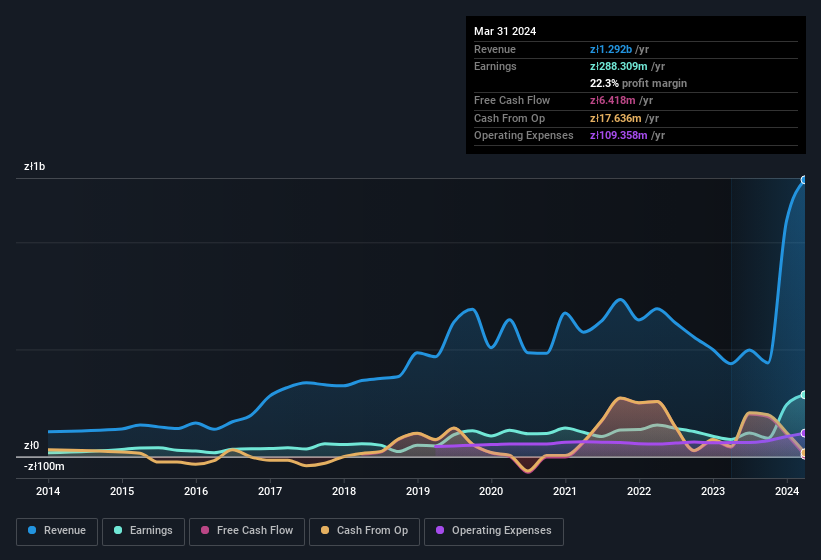Archicom S.A. (WSE:ARH) recently released a strong earnings report, and the market responded by raising the share price. Despite the strong profit numbers, we believe that there are some deeper issues which investors should look into.
Check out our latest analysis for Archicom

Zooming In On Archicom's Earnings
Many investors haven't heard of the accrual ratio from cashflow, but it is actually a useful measure of how well a company's profit is backed up by free cash flow (FCF) during a given period. The accrual ratio subtracts the FCF from the profit for a given period, and divides the result by the average operating assets of the company over that time. The ratio shows us how much a company's profit exceeds its FCF.
That means a negative accrual ratio is a good thing, because it shows that the company is bringing in more free cash flow than its profit would suggest. While having an accrual ratio above zero is of little concern, we do think it's worth noting when a company has a relatively high accrual ratio. Notably, there is some academic evidence that suggests that a high accrual ratio is a bad sign for near-term profits, generally speaking.
For the year to March 2024, Archicom had an accrual ratio of 0.26. We can therefore deduce that its free cash flow fell well short of covering its statutory profit. To wit, it produced free cash flow of zł6.4m during the period, falling well short of its reported profit of zł288.3m. Archicom's free cash flow actually declined over the last year, but it may bounce back next year, since free cash flow is often more volatile than accounting profits. Notably, the company has issued new shares, thus diluting existing shareholders and reducing their share of future earnings.
That might leave you wondering what analysts are forecasting in terms of future profitability. Luckily, you can click here to see an interactive graph depicting future profitability, based on their estimates.
In order to understand the potential for per share returns, it is essential to consider how much a company is diluting shareholders. In fact, Archicom increased the number of shares on issue by 128% over the last twelve months by issuing new shares. As a result, its net income is now split between a greater number of shares. To celebrate net income while ignoring dilution is like rejoicing because you have a single slice of a larger pizza, but ignoring the fact that the pizza is now cut into many more slices. Check out Archicom's historical EPS growth by clicking on this link.
A Look At The Impact Of Archicom's Dilution On Its Earnings Per Share (EPS)
Archicom has improved its profit over the last three years, with an annualized gain of 154% in that time. In comparison, earnings per share only gained 42% over the same period. And the 262% profit boost in the last year certainly seems impressive at first glance. On the other hand, earnings per share are only up 102% in that time. And so, you can see quite clearly that dilution is having a rather significant impact on shareholders.
In the long term, earnings per share growth should beget share price growth. So Archicom shareholders will want to see that EPS figure continue to increase. However, if its profit increases while its earnings per share stay flat (or even fall) then shareholders might not see much benefit. For that reason, you could say that EPS is more important that net income in the long run, assuming the goal is to assess whether a company's share price might grow.
Our Take On Archicom's Profit Performance
As it turns out, Archicom couldn't match its profit with cashflow and its dilution means that earnings per share growth is lagging net income growth. For the reasons mentioned above, we think that a perfunctory glance at Archicom's statutory profits might make it look better than it really is on an underlying level. If you'd like to know more about Archicom as a business, it's important to be aware of any risks it's facing. To help with this, we've discovered 3 warning signs (2 are significant!) that you ought to be aware of before buying any shares in Archicom.
In this article we've looked at a number of factors that can impair the utility of profit numbers, and we've come away cautious. But there are plenty of other ways to inform your opinion of a company. For example, many people consider a high return on equity as an indication of favorable business economics, while others like to 'follow the money' and search out stocks that insiders are buying. While it might take a little research on your behalf, you may find this free collection of companies boasting high return on equity, or this list of stocks with significant insider holdings to be useful.
New: Manage All Your Stock Portfolios in One Place
We've created the ultimate portfolio companion for stock investors, and it's free.
• Connect an unlimited number of Portfolios and see your total in one currency
• Be alerted to new Warning Signs or Risks via email or mobile
• Track the Fair Value of your stocks
Have feedback on this article? Concerned about the content? Get in touch with us directly. Alternatively, email editorial-team (at) simplywallst.com.
This article by Simply Wall St is general in nature. We provide commentary based on historical data and analyst forecasts only using an unbiased methodology and our articles are not intended to be financial advice. It does not constitute a recommendation to buy or sell any stock, and does not take account of your objectives, or your financial situation. We aim to bring you long-term focused analysis driven by fundamental data. Note that our analysis may not factor in the latest price-sensitive company announcements or qualitative material. Simply Wall St has no position in any stocks mentioned.
About WSE:ARH
Exceptional growth potential with adequate balance sheet.
Market Insights
Community Narratives





